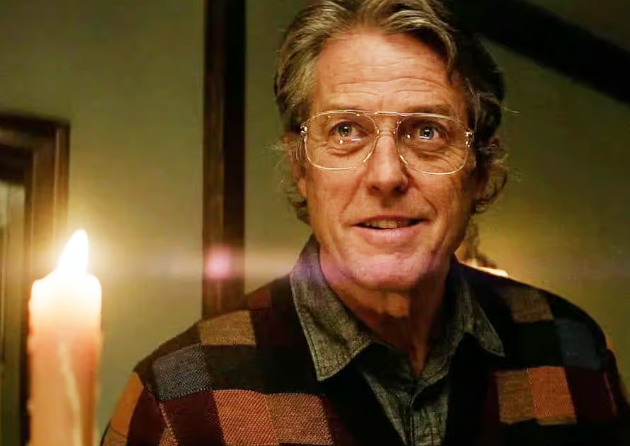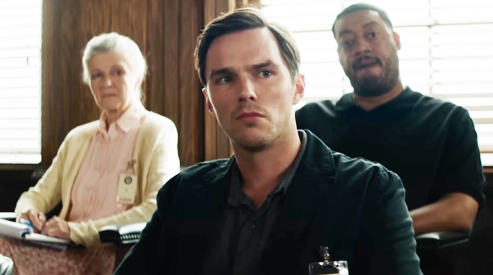HERETIC

Hugh Grant, Sophie Thatcher, Chloe East
Director: Scott Beck, Bryan Woods
Time: 110 min
A twisted sadist behind a pitiless battle of wills is Mr. Reed (Hugh Grant), a mysterious atheist who lives in a small, ornate rural home that will serve as the playing field, while the participants, Sister Barnes (Sophie Thatcher) and Sister Paxton (Chloe East), are young Latter-day Saint missionaries going door-to-door selling their word of God. While the mind games that follow may not involve elaborate torture mechanisms and extreme bloodletting, the girls will still be forced to make a series of fraught decisions as part of a perverse inquisition designed to break down their faith.
The young Mormons arrive on Mr. Reed’s doorstep at the start of a sudden downpour, aptly setting the stage for what’s to come. Slightly eccentric, but seemingly benign, and expressing interest in hearing what they have to say, Mr. Reed invites them inside, and the girls accept with the caveat that his wife, who is apparently in the kitchen baking a blueberry pie, must join them due to their church’s strict rules (they can’t be alone with another man who isn’t their husband). As soon as the front door portentously closes behind the girls, it’s readily apparent to any seasoned horror fan that this a trap. For the girls, though, it’s one they only begin to realise gradually, once Mr. Reed’s significant other fails to appear (his explanation is that she’s shy) and their conversation moves from initial pleasantries to more invasive questioning on his part. Mr. Reed’s psychological sparring with Sisters Barnes and Paxton is one of the film’s chief pleasures, and Thatcher and East more than hold their own against Grant’s coiled intensity. When Mr. Reed offers the girls a choice between two doors that will take them through the house, one marked “Belief” and one “Disbelief,” a nail-biting stand-off of sorts ensues as Sister Barnes, the more grounded and wary of the two, and Sister Paxton, the agreeable optimist, attempt to work out their captor’s thought process and reach an equal footing. As Mr. Reed preaches his ideas of religion in what’s clearly a means of exerting control over the missionaries, it’s refreshing that the film gives the girls a sense of agency and individual willpower. Even if you were to believe that the girls were led into this situation by the very church that was supposed to save them, the filmmakers have the characters think through each subsequent dilemma instead of having them default to making illogically naive decisions. Meanwhile, the intricately designed house is a character in its own right, mirroring the girls’ mental state as Mr. Reed’s delivers his nightmarish, but thrillingly plausible theology lesson.
While Heretic’s lack of thematic subtlety isn’t necessarily a hindrance, at almost two hours, the film does begin to feel like it’s beginning to flog a dead horse by the time we get to the last act. It also falls victim to exposition, through over-explanatory flashback-heavy finales - and it concludes with some schmaltzy sentiments about praying, that ring more than a little hollow, given the prankish nature of what’s defined the film up to this point. But unlike Mr. Reed’s speechifying, Beck and Woods’ film avoids condescending to its audience and allows a creeping fear to arise slowly and naturally from the proceedings, mostly through words and looks rather than garish spectacle. Perhaps a bit more ambiguity in Heretic’s ending would have made the film soar into the heavens, but it still offers up a stimulating portrait of a hell forged through the rigidity of one person’s deranged view of the world – and Hugh Grant, as ever nowadays, gives an outstanding performance.

Cast: Nicholas Hoult, Toni Collette, J. K. Simmons, Chris Messina, Zoey Deutch, Cedric Yarbrough, Kiefer Sutherland
Producer/Director: Clint Eastwood
114 Minutes
At the time of this review, he is 94 years of age, and the legendary Clint Eastwood shows no signs of slowing down, continually reading scripts, going into production, and pumping out his films quickly. His last directorial effort Cry Macho, which was rumoured to possibly be his last time acting in front of the camera which led many to believe it might also be his last directorial effort, sadly left much to be desired as a potential swan song for the multi-time Academy Award-winning filmmaker. While no such expectations have been placed on Juror #2, Eastwood’s latest directorial offering, the film hasn’t received the level of care from its studio and distributor as any film from Eastwood at this point in his career should be gaining. The man has done it all in this business, and at the very least, he has earned our respect, even if his films may not always hit the mark. Luckily, Juror #2 is a solid directorial effort from Eastwood. Although it may not rank among his best work, it’s still a riveting courtroom drama with much to say regarding the American legal system and how the pursuit of justice is never black and white.
Cartoonist, artist, and recovering alcoholic Justin Kemp (Nicholas Hoult) is expecting his first child with his wife Ally (Zoey Deutch). He has recently been called to jury duty in the state of Georgia for a murder trial. James Sythe (Gabriel Basso), a former gang member, has been accused of killing his girlfriend Kendall Carter (played by Eastwood’s own daughter, Francesca Eastwood) after a public argument the two had at a local bar on a dark, rainy night. There are eyewitnesses for the fight, and there is even one who claims he saw James on the road near the overpass where Kendall’s body was later found with her skull bashed in. The evidence all points toward James as the only suspect; at least, that’s what prosecutor Faith Killebrew (Toni Collette) is trying to convince the twelve members of the jury (as she’s simultaneously pursuing the District Attorney position) as the public defender, Erik Resnick (Chris Messina), is convinced his client is innocent and tries to sway them in the other direction. This seems like a fairly open-and-shut case. Except there’s one problem: as the trial unfolds, Justin realises he, too, was at the bar that night, and he is directly involved in the murder, which, if revealed, could jeopardise the trial and his entire family. With an intriguing premise, Juror #2’s greatest asset is its performers. In this unusual “About A Boy” reunion, Nicholas Hoult and Toni Collette produce strong work as two individuals racked by moral guilt the deeper they hurl themselves into the case. There are intriguing characters played by J.K. Simmons (a former cop on the jury who decides to conduct his own investigation outside of the court proceedings) and Kiefer Sutherland as another lawyer and Justin’s AA group leader who supports him as the actual complicity of Justin in the murder is brought to light. Sadly, the film forgets about both of them as the plot needs time to focus on the other members of the jury (Cedric Yarbrough is a stand-out as a man wholly convinced James is innocent), the details of the court case itself both from within the courtroom told through testimony and through flashbacks to what really happened that night at the bar between Kendall and James. Eastwood, being the efficient filmmaker he is, does not typically allow his films to run too long, so with just under two hours of running time, the film can’t possibly give everyone involved equal weight. But where it counts, primarily the clash over what true justice entails and carrying the burden of guilt on one’s shoulders, between Justin and Faith, the film does an adequate job of keeping the plot moving, giving us a gripping character-driven story that tightens the screws on its protagonist until the third act, where it keeps you guessing until the end, just exactly how this will all turn out for Justin. Hoult and Colette are more than capable of carrying this sometimes lethargically paced film to its conclusion, giving us a lot to chew on as far as the imperfections of our justice system. While Eastwood films can sometimes veer into the overly political, Juror #2 keeps those tendencies to a minimum, concentrating his vitriol more towards the broken system that is meant to deliver justice but sometimes does not. This might be Eastwood’s last film, but perhaps it may not be. Given how quickly he works, for all we know, he may still have a few more in the tank. But if this is the film he goes out on, at least it’s a competently made one with two strong performances, one hell of an exciting (albeit preposterous) premise that feels like it was ripped straight out of the 90’s legal thrillers we used to commonly see all the time before the entire cinematic landscape changed, and something meaningful to say regarding the American justice system that most can agree on in these politically divided times. Like the system itself, Juror #2 may not be perfect, it’s not even great, but it’s the one the Yanks have, and it’s the idea that it can be better that keeps people on the hook.